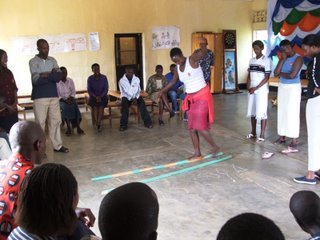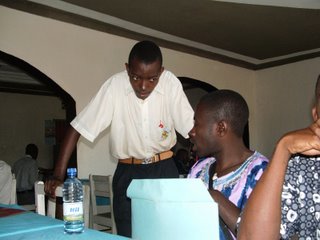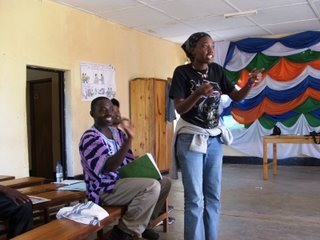Ground-Breaking Hotel and Restaurant Program



(Pictured Above: 1. Hotel and Restaurant Trainees do the bridge game about abstinence and condom usage. 2. Prosper Wears his Badge of Hope at Savannah Restaurant. 3. RAPSIDA's Rose Tuyishime and PJLS' Peter Munyarukiko in a moment of the first week's training session.)
RAPSIDA Launches Ground-Breaking Hotel & Restaurant Pilot Project in Nyagatare
In April, RAPSIDA began training hotel and restaurant workers in Nyagatare. This is the first program of its kind in Rwanda, according to health professionals, and very important because these workers are both at-risk, given their pay/circumstances, and potentially influential, given the many people they meet.
RAPSIDA’s pilot project has already achieved results: a hotel/restaurant worker collective has been formed to prevent HIV/AIDS and discrimination—approved by the Mayor and the restaurant owners. The worker trainees are now training co-workers, and all trainees are wearing the HIV-Awareness red-ribbons at work, with full knowledge of the ribbon’s deep meaning, which they can pass along to their customers as well. A week-long Badge of Hope program, during which all restaurants/hotels in the town will become focal points of HIV Awareness, begins June 9th, with educational activities, competitions, and promotions galore!
Amazing Story from Week 1: One trainee was wearing his red ribbon while tending the billiard table at his hotel when one of the billiard players called him to the corner to explain the meaning of the red ribbon. Afterwards, the billiard player privately asked the trainee if he would buy him a condom because the billiard player would soon be having sex but was too shy to buy a condom at the local store, where he knew people. The trusted RAPSIDA trainee bought the condom for the billiard player, perhaps saving his life.
Full Story:
Introduction
Nyagatare is a medium sized trading town in the northeastern corner of Rwanda. It boasts Rwanda’s greatest number of cows and a beautiful rolling countryside, but it also has the country’s second highest prevalence of HIV, and is characterized by communal silence toward the disease.
Numerous restaurants, bars, and hotels line the one paved road through the center of Nyagatare, and spill over into the hills nearby. These establishments are normally full of customers, and employ approximately 170 hotel and restaurant workers.
Given the transient lifestyle and low pay scale of these workers, they are highly vulnerable to the spread of HIV; for example, the young women waitresses often turn to prostitution to supplement their wages, and condoms are not the norm.
At the same time, given their direct interaction with so many people on a given day at their restaurants, these workers could also be highly influential in preventing the spread of HIV and discrimination if they can be inspired to help spread educational messages.
Thus, RAPSIDA heeded the call of the National Youth Council and club anti-SIDA PJLS to come to Nyagatare to help inspire, train, and organize the hotel and restaurant workers in the town.
The First Workshop
The program began with a three day session in April, during which 22 workers from 12 different establishments received training in HIV Awareness and Prevention, including condom demonstrations, from RAP and PJLS trainers. In addition, they discussed their particular situations with RAPSIDA both in a large group and separated according to gender.
During the workshop, the workers developed a strong collective understanding of their vulnerabilities as well as an understanding of their special position of influence. They even decided that they would like to organize themselves into a collective, called Ibyiringiro “Hope” Association, so as to cater to their particular needs, such as fighting for workers’ rights and advocating for a dormitory, especially for female workers.
In addition, all of the trainees received pins/badges with the internationally recognized symbol for HIV and AIDS Awareness, the “Red Ribbon.” Some pins were donated by RAP and others donated by VSO, Volunteer Services Overseas, a fabulous organization that occasionally works with PJLS in Nyagatare as well. During the three day training, RAPSIDA Trainers explained the significance of the red-ribbon to the workers, and created a list of reasons for wearing the badges, providing each restaurant with a copy of the list.
On the third day, the trainees presented what they had learned to the owners of the restaurants and hotels at a conclusion ceremony, which included a lunch prepared by a local group of women who are openly HIV+.
Overall, the restaurant owners were highly impressed with the motivation and learning of the workers who had attended the training, which, significantly, had taken place during normal working hours. The bosses also indicated their support for the new collective of workers and said that they looked forward to its development, under the guidance of the National Youth Council. RAPSIDA said that it would continue to work with the new worker collective on issues related to HIV Prevention and Destigmatization.
All trainees were given certificates, and the bosses each received a certificate to place on the restaurant wall to indicate that some of their workers had been trained by RAPSIDA. The certificate states that the workers who were trained will always be wearing their beaded pins/badges with the red-ribbon.
At the conclusion of the workshop, the workers agreed to wear the small badges at all times when they are at their restaurants, and then after one week they agreed to come to a follow-up meeting to discuss their experiences with RAPSIDA.
Immediate Impact of the Training and the Red-Ribbons
One week later, interviews with the workers revealed the amazing effect their training had had on them, their bosses, the other workers, and even the general public. The bosses at some restaurants had asked for reports from the trainees and for them to start training their peers at work. Some bosses gave all of their workers time to meet with each other when business was slow. Several of the workers reported giving condom demonstrations to their peers with pride. They were pleased to be given knowledge about condoms because generally they only receive messages about abstinence from religious organizations.
Specifically, the bead-badges with the image of the red-ribbon had a big effect. All workers at the follow-up meeting stated that they had worn their badges with pride for the whole week. Some trainees reported that their co-workers and customers had accused them of being HIV+ for wearing the red-ribbon, but the trainees did not become shy. They did not remove the badges. Rather, they explained to the restaurant clients and co-workers the true meaning of the red-ribbon and how it encourages people to talk about HIV and AIDS, to try prevent actions that lead to HIV transmission including sexual harassment, and also to commit to supporting those who have HIV. The trainees added, “We felt strong because of the workshop; the information we gained from RAPSIDA helped us feel confident.” Some of those customers who had inquired about the HIV status then asked if they too could wear the badge.
Most importantly, some of the customers viewed the red-ribbon wearers as trustworthy and caring, and entrusted them with life-saving information. One customer asked one of workers if he would purchase a condom for him. The customer was too shy to go and buy one at the store; and there were no condoms available in the hotel bathrooms or bedrooms; and he was going to have sex regardless. After discussing the significance of the bead-badge worn by the RAPSIDA trainee, this man knew he could trust the trainee to help him do the right thing.
These are just several examples of the kinds of conversations that arose when the trainees wore the red-ribbon consistently and responsibly. They now know what the ribbon means and they are committed to spreading its message, and information about HIV and AIDS.
At the follow-up meeting, the workers were allowed to take several smaller badges back to their workplaces, provided that the people who get the badges will be trained to understand the concept of the badges.
Plans for the Future: Badge of Hope Program to Start in Nyagatare
The workshop with the hotel and restaurant workers was so inspiring that RAPSIDA has now decided to lay down roots there for the next 6 months, partnering with PJLS and its Director Peter Munyarukiko, in order to continue working with these motivated young people and their work-establishments. Specifically, the focus will be on training all hotel/restaurant workers, and using the red-ribbon badges and other creative ideas to spark dialogue and change in others. The Mayor of the District, Robert Gashemeza, has opened wide his doors to RAPSIDA, and the Badge of Hope program—previously inaugurated in the RAPSIDA Schools program—is being adapted to fit the restaurant/hotel situation, and is set to start in Early June.
Description of the HIV/AIDS Awareness Week in Nyagatare
For the entire week, all HRBs will be doing something the entire time to raise awareness, but there are special activities assigned to one HRB per half day, in a competition element. All Participating HRBs will have a chance to compete for the best AIDS Awareness Day, during which their workers will perform peer education activities in front of the HRB on their special day.
At the opening ceremony, the Mayor will officially open the Awareness week.
A banner will move from one HRB to the next to show the public where the competition is taking place on that day.
All HRBs will receive:
· Placemats/Sou-Plats with information about the red-ribbon and pictures from the workshops with the local trainees, laminated for durability
· HIV Prevention Posters for the walls
· Small Red Ribbon Badges for all of the employees
· Small Red Ribbon Badges for SALE that can be sold to customers for a reduced price when they buy a meal.
· Written materials to clarify the program and educate the customers and workers
· Art Work: Created by PVV for the walls in the HRB
· Free Desserts on Competition Days: Customers buying a meal get a free dessert (such as fruit which was grown by an association of PLWHA or a cake made by someone with HIV). This dessert will be available for free on the day that each HRB is competing.
· Fanta Motivation on Competition Days: During each competition day at each HRB, RAPSIDA will be able to award up to 5 coupons for a free Fanta/Soda to people who are wearing the red-ribbon outside in the community and who can demonstrate their knowledge of the meaning/importance of the red ribbon. The HRB owners will also have a chance to do so.
Other promotions to be handled by the RAPSIDA Trainer on-duty:
· Small Red Ribbon Badges available for a half day of Volunteering: Those people who do not want to buy the badge can sign-up for a special day organized by RAPSIDA at the beginning and end of the two weeks. The volunteers will visit with an association, maybe help someone who is sick with AIDS, working around their house, maybe just committing to being trained about the basics of HIV Prevention and Destigmatization.
· The Big Red Ribbon Ikimenyetso: The large badge will be worn by one of the workers at the HRB who were previously trained by RAP. The workers wear the badge for the special day. They will be the primary point of contact for the RAP/PJLS trainers who will be helping with the activities at the HRB. Also, they will keep a journal about the various experiences that occur at the HRB during that week. All workers will be interviewed by the big Iki wearer about their experiences at the HRB, and their ideas will be recorded in the journal.
On the final day, all HRBs will send representatives to a final ceremony at the youth center to celebrate the achievements of all the HRBs and to get the results of the competition. Refreshments made by PLWHA will be served. The final ceremony will be open to all the people in the town who have the red-ribbon bead badges; and of course will include a discussion about the next steps in the program.
<< Home